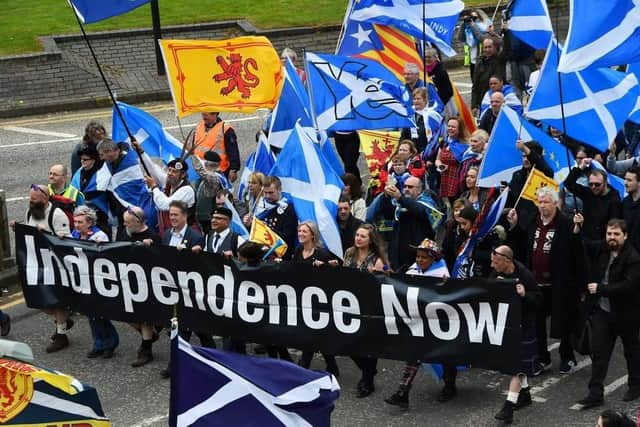Scottish independence: SNP granted permission to intervene in independence referendum court battle
An update from the court said the party would be allowed to make a written submission limited to 20 pages, to be filed no later than September 21.
The SNP had sought permission to make written submissions and “short oral submissions” during the hearings scheduled for October 11 and 12.
However, the latter was not granted by the court.


Advertisement
Hide AdAdvertisement
Hide AdIt comes after Lord Advocate Dorothy Bain, Scotland’s top law officer, referred a prospective referendum Bill to the UK Supreme Court to determine if it is within Holyrood’s powers.
The legal arguments centre on differing interpretations of the Scotland Act 1998, which says matters relating to the Union are reserved to Westminster.
First Minister Nicola Sturgeon wants to hold a referendum in October next year, but the UK Government has refused to agree to this.
In a 15-page application to the court last month on behalf of the SNP, lawyers Claire Mitchell QC and David Welsh said the party’s plan to hold a consultative referendum on independence would not “of itself” have any effect on the Union.
They argued it would be “fair, just and reasonable” to allow the SNP to intervene in the proceedings.
And they said the SNP’s arguments are intended to complement, and not detract from, those of Ms Bain.
The application argued the right to self-determination is one that is “fundamental and inalienable”, and said the SNP’s position is the Scottish Parliament “does have the legislative competence to legislate for a referendum on Scottish independence”.
It echoed arguments put forward by Ms Bain that a referendum on independence would be to ascertain the views of the Scottish people and would not automatically implement the result.
Advertisement
Hide AdAdvertisement
Hide Ad“The applicant regards it of fundamental importance to these proceedings that it be recognised that the holding of a referendum, such as that which is being proposed, does not of itself implement the result or the outcome of that referendum,” the application said.
"The referendum indicates the view of the demos on the question posed to it.
"That there will be subsequent secondary discussions between the UK and Scottish governments in the event that the Scottish people indicate their support for Scottish independence does not change that.
"Those discussions are separate from the referendum and do not inform its purpose.”
The application said the “referendum itself is not an act of secession; it is not a unilateral declaration of independence”.
It said: “Put short, the holding of a consultative referendum does not result in a reduction in the scope of the powers of the UK Parliament and nor does it, of itself, have any effect on the Union.
"Legislation to enable such a referendum does not, therefore, in the respectful submission of the applicant, relate to the reservation of the Union nor to the Parliament of the United Kingdom.”
The court ordered that the application to intervene be granted “by way of written submissions only limited to 20 pages and avoiding repetition of the Lord Advocate’s arguments”.
It said the other parties to the case, such as the UK Government, would be allowed to produce written responses, each limited to 20 pages, to be filed within 14 days of the SNP’s submission.
Comments
Want to join the conversation? Please or to comment on this article.

